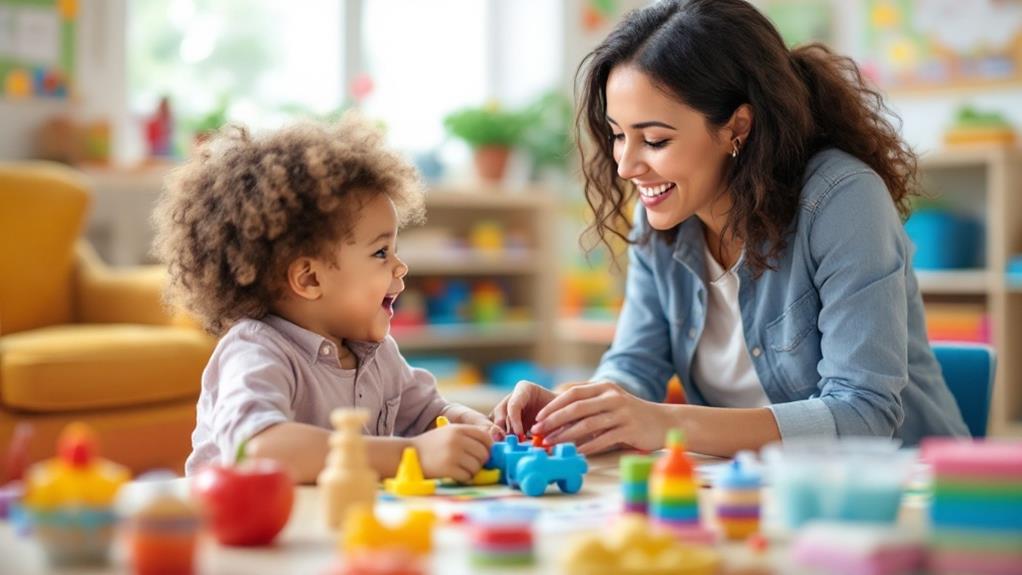Therapy services like ABA, Occupational Therapy, and Speech Therapy are powerful pathways for you to help your child build confidence and independence. By breaking down complex tasks and focusing on small victories, ABA nurtures positive behaviors and social skills. OT enhances daily living skills and fine motor abilities, encouraging your child's resilience. Meanwhile, Speech Therapy reveals their voice, enabling effective communication and connection. Together, these therapies create a supportive network that fosters essential life skills and emotional growth. As you explore these transformative journeys, you'll uncover ways to strengthen your child's self-esteem and adaptability.
Key Takeaways
- ABA therapy encourages positive behaviors through manageable steps and reinforcement, building children's confidence in social interactions and daily activities.
- Occupational therapy enhances fine motor skills and resilience, empowering children to engage successfully in essential life tasks and boosting self-esteem.
- Speech therapy improves communication abilities, enabling children to express thoughts and emotions effectively, fostering connections with peers and promoting independence.
- Collaborative therapy approaches combine insights from ABA, OT, and Speech Therapy, maximizing individualized strategies that address each child's unique needs and challenges.
- Successful engagement in therapy activities cultivates emotional resilience, equipping children with essential life skills for future social and academic success.
Importance of Confidence in Children

Building confidence in children is essential for their overall development and well-being. When you nurture a child's self-esteem, you help them believe in their abilities and embrace challenges. This foundation allows them to explore their interests and take risks, vital for learning and growth. Imagine how empowering it's for a child to face a new situation with a sense of self-assuredness!
You may notice that confident children are more willing to engage with peers and express themselves. They develop resilience, bouncing back from setbacks and viewing mistakes as opportunities for improvement. As you support their journey, you're not just helping them succeed academically or socially; you're instilling a lifelong love for learning and personal growth.
Encouraging confidence can be as simple as celebrating small achievements and providing consistent praise. It's about creating an environment where a child feels safe to express themselves and explore their potential.
When you invest in building their confidence, you're equipping them with the tools they'll need to navigate life's challenges. Remember, every child has a unique spark; your encouragement can help ignite that flame, leading to a brighter future.
Overview of Therapy Services
Exploring therapy services for children can be a transformative journey, offering them the support they need to thrive emotionally and socially. These services, including Applied Behavior Analysis (ABA), Occupational Therapy (OT), and Speech Therapy, play crucial roles in helping children develop essential life skills.
Each therapy type focuses on unique aspects of a child's growth, guiding them towards greater independence. ABA helps children understand and manage their behaviors, fostering positive social interactions and communication. It empowers them to navigate their environments with confidence, which is essential for building lasting relationships.
OT, on the other hand, enhances a child's fine motor skills and sensory processing, allowing them to engage in daily activities with ease and enjoyment. Speech Therapy focuses on improving communication skills, ensuring children can express their thoughts and feelings effectively.
With tailored approaches, each therapy service works harmoniously to create a supportive foundation for your child's development. As you initiate this journey, remember that these therapies don't just address challenges; they nurture potential.
Embracing this holistic approach can lead to remarkable growth, helping children become resilient, independent individuals ready to face the world.
Role of ABA in Skill Development

Through the lens of Applied Behavior Analysis (ABA), you can witness profound changes in your child's skill development. ABA focuses on understanding behavior and using that knowledge to encourage positive habits. By breaking down complex tasks into manageable steps, you help your child learn essential skills at their own pace.
You'll see your child gain confidence as they master these skills, whether it's learning to communicate effectively or developing social interactions. Each small success builds a foundation for greater independence, nurturing a sense of achievement that's priceless.
By employing techniques like positive reinforcement, you create an environment where your child feels safe to explore and learn. This approach respects their individual needs and encourages them to engage actively in their own growth.
As you collaborate with ABA professionals, you'll discover tailored strategies that resonate with your child's unique strengths. This partnership fosters not just skill development but also a deeper understanding of their abilities, paving the way for a brighter future.
Embrace this journey, and watch as your child flourishes into a more capable, confident individual ready to navigate the world.
Benefits of Occupational Therapy
Occupational therapy offers a transformative approach to helping children engage in everyday activities that matter most to them. Through tailored interventions, you'll see your child gain the skills needed to participate fully in daily life, be it dressing, writing, or playing with peers. This empowerment nurtures their confidence, allowing them to explore their world without hesitation.
As your child works on fine motor skills, they'll not only improve their ability to manipulate objects but also build resilience and persistence. These small victories can lead to significant changes in their self-esteem and overall outlook on challenges. You'll witness them developing critical problem-solving abilities, which are essential for maneuvering life's complexities.
Moreover, occupational therapy fosters social skills by encouraging cooperative play and interaction with others, helping your child build meaningful relationships. You'll find that as they become more independent, their joy in accomplishing tasks will inspire them and those around them.
Ultimately, when you invest in occupational therapy, you're not just helping your child with skills; you're helping them discover their potential and embrace the beautiful journey of growing up.
Enhancing Communication With Speech Therapy

Building on the foundation of skills acquired in occupational therapy, enhancing communication through speech therapy can greatly impact your child's ability to express themselves and connect with others.
Speech therapy provides your child with the tools they need to articulate thoughts, emotions, and needs effectively. Through tailored exercises and engaging activities, your child learns to navigate conversations, improving not just their speech but also their confidence.
Imagine the joy your child will feel when they can share their favorite stories or ask for help in their own words. This newfound ability fosters connections with peers, family, and teachers, creating a sense of belonging.
Speech therapy isn't just about speaking; it's about building relationships and understanding.
As you witness your child's progress, you'll see them flourish. Each session is a step toward greater independence and self-advocacy.
By empowering your child to communicate effectively, you're not only supporting their current needs but also setting them up for a brighter future.
Collaborative Approach in Therapy
In a world where every child thrives on connection, a collaborative approach in therapy becomes essential for fostering growth and development. When you bring together specialists in ABA, occupational therapy, and speech therapy, you create a supportive environment that enhances your child's skills and confidence.
This teamwork allows for a more thorough understanding of each child's unique needs, ensuring that their therapy is cohesive and effective.
By working together, therapists can:
- Share insights that lead to tailored strategies for each child's specific challenges.
- Coordinate goals across different disciplines, aligning efforts for maximum impact.
- Engage families in the process, empowering you to reinforce skills at home.
- Celebrate progress collectively, creating a strong support network that motivates your child.
When you embrace this collaborative spirit, you not only enhance your child's therapy experience but also inspire them to take charge of their own growth.
Success Stories and Testimonials

The collaborative approach in therapy often leads to remarkable transformations, and the success stories that emerge are a demonstration of this shared effort.
You might recall the story of a young boy who struggled with communication. Through a combination of speech therapy and ABA techniques, he not only learned to express himself but also developed friendships he never thought possible. His smile says it all—the joy of connection.
Then there's the girl who faced daily challenges with fine motor skills. Occupational therapy empowered her to improve her coordination, enabling her to engage in activities like writing and drawing. Her progress filled her with confidence, and her proud display of artwork became a representation of her hard work.
These stories remind us that every child's journey is unique, yet each reflects the dedication of therapists, families, and support systems coming together.
When you embrace this collaborative spirit, you witness profound changes. Each success story serves as a beacon of hope and inspiration, encouraging you to believe in the potential of every child.
Through shared efforts, we truly empower them to embrace life with confidence and independence.
Tips for Supporting Therapy at Home
Supporting your child's therapy journey at home can make a significant difference in their progress and confidence. By actively engaging with them in their therapeutic activities, you help reinforce the skills they're learning. Here are some tips to support your child's therapy at home:
- Create a Consistent Routine: Establish a daily schedule that includes time for therapy activities. Consistency helps children feel secure and reinforces learning.
- Make It Fun: Incorporate games and playful activities that align with their therapy goals. Fun and engagement can motivate your child to participate willingly.
- Communicate Openly: Talk with your child about their therapy goals and celebrate their successes, no matter how small. This encourages a positive mindset and boosts their self-esteem.
- Collaborate with Therapists: Stay in touch with your child's therapists to understand strategies that can be practiced at home. Their insights can guide you in providing effective support.
Future Impact of Therapy Services

Therapy services can profoundly shape your child's future, setting the stage for lifelong skills and confidence. As your child engages in ABA, OT, and speech therapy, they're not just learning; they're building a foundation for independence.
These therapies equip them with essential life skills that transcend the therapy room, influencing their social interactions, academic success, and overall well-being.
Imagine your child maneuvering challenges with resilience, communicating their needs effectively, and forming meaningful relationships. Therapy fosters this growth, empowering your child to face the world with self-assurance. Each session is a step toward greater independence, paving the way for future opportunities and experiences.
The impact of therapy services extends beyond immediate skills. You're nurturing a mindset of adaptability and problem-solving that will serve your child throughout life.
As they learn to overcome obstacles, they develop a sense of agency that fuels their motivation to explore the world around them.
Conclusion
As you witness your child's journey through therapy, it might seem ironic that learning essential life skills often comes from structured sessions. Yet, in embracing ABA, OT, and speech therapy, you're not just guiding them; you're empowering them to build confidence and independence. Each small victory paves the way for a brighter future, reminding you that the path to self-sufficiency often begins with a little help. Together, you're nurturing resilience and revealing their true potential.
